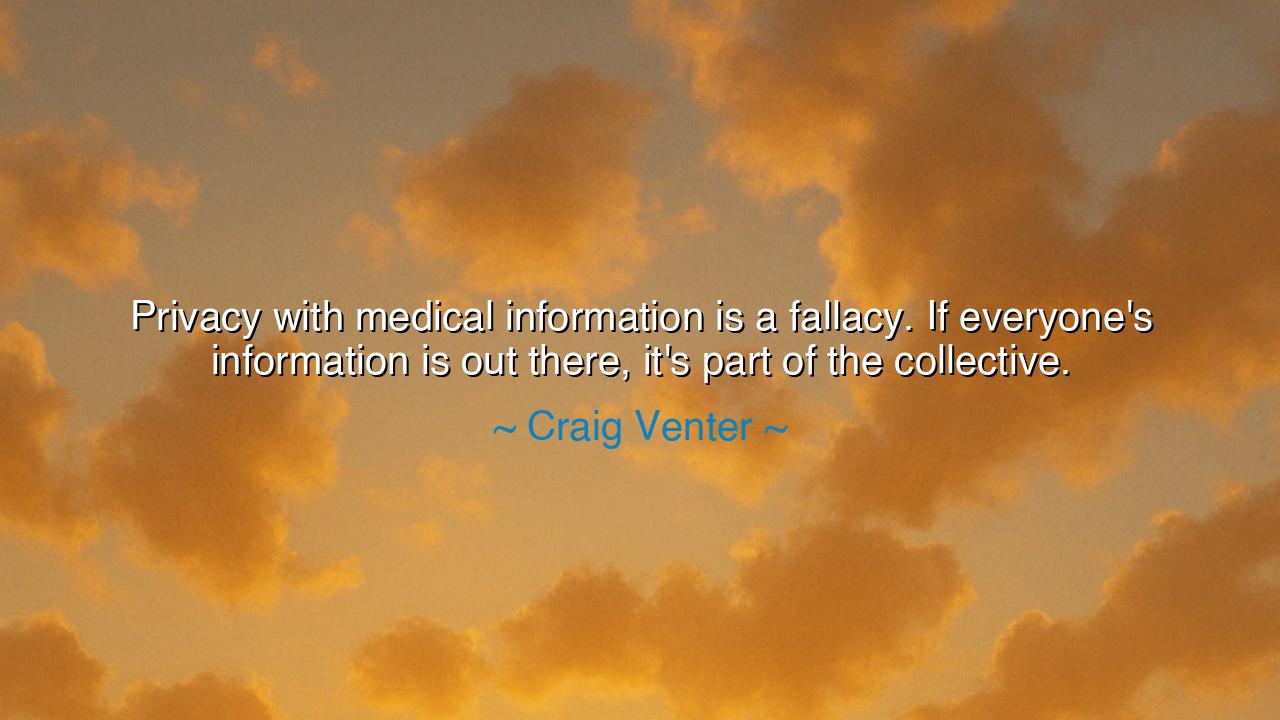
Privacy with medical information is a fallacy. If everyone's
Privacy with medical information is a fallacy. If everyone's information is out there, it's part of the collective.






Hear now the words of Craig Venter, pioneer of the human genome, who declared with both boldness and provocation: “Privacy with medical information is a fallacy. If everyone’s information is out there, it’s part of the collective.” At first glance, these words may trouble the heart, for they seem to strike against the sacred veil of privacy. Yet if we look deeper, we find an ancient teaching renewed in modern form: that knowledge of the body and its afflictions belongs not to one alone, but to all humanity, when it is gathered into the wisdom of the collective.
In times of old, the healer’s art was never the possession of a single tribe. The herbs known in Egypt, the surgeries practiced in India, the cauteries of Greece—all these were shared, carried along the roads of trade and war, each generation adding to the pool of wisdom. Had the healers hidden their knowledge, the sick would have perished, and progress would have been stilled. Venter’s saying is a call back to this ancient way: when the stories of our flesh and our sickness are joined together, the collective gains strength, and the healing of future generations becomes swifter and surer.
But there is pain in this truth. The fear of exposure is deep within us, for what is more intimate than the knowledge of our own bodies? To say that privacy is a fallacy is to strip away the comfort of secrecy and to acknowledge that, in an age of data, the lines are already blurred. Our medical records, our histories, even our very DNA, already flow through channels beyond our control. And yet, Venter’s words invite us not to despair, but to transform fear into power. For if the flood cannot be stopped, then let it be channeled toward the good of all.
Let us recall the story of Dr. Ignaz Semmelweis in the nineteenth century. He discovered that simple handwashing could prevent the deaths of mothers in childbirth. Yet his insight was rejected, in part because physicians guarded their reputations and resisted the sharing of uncomfortable truths. Thousands died because knowledge was hidden rather than shared. Imagine, O listener, if such resistance had not prevailed, and the collective wisdom had been embraced. So too, today, if we withhold our medical truths out of fear, we may deny others the discoveries that could save them.
The saying of Venter is thus a call to courage: to see our private struggles not only as burdens, but as gifts that can be offered to the collective. For in every record of disease lies the seed of discovery, and in every genome mapped lies the possibility of healing countless others. If one life is laid bare, then many may be spared. The sacrifice of secrecy becomes the triumph of survival.
Yet, O children of the future, do not mistake this teaching. To give one’s medical truth to the collective is not to surrender blindly to powers that exploit, but to contribute wisely to the community of knowledge. The lesson is to demand systems built upon honor, transparency, and justice—so that our information is not used against us, but wielded for the healing of all. Just as warriors in ancient times entrusted their swords to their kin, so too must we entrust our data to stewards worthy of that responsibility.
And so the wisdom stands clear: privacy may fade, but the collective may rise. You must choose whether your fear of exposure will silence you, or whether your courage will allow your life to be part of a greater cure. The path forward is to embrace openness while insisting on fairness, to contribute what is uniquely yours while safeguarding the dignity of all. For in the end, the body is mortal, but the collective of knowledge is eternal, carrying the healing flame across generations yet unborn.






AAdministratorAdministrator
Welcome, honored guests. Please leave a comment, we will respond soon